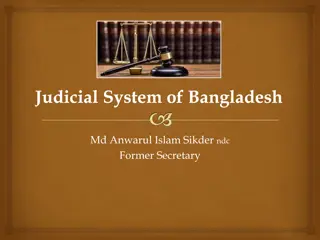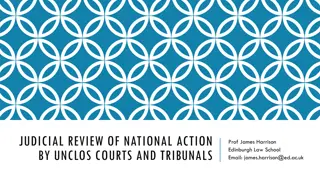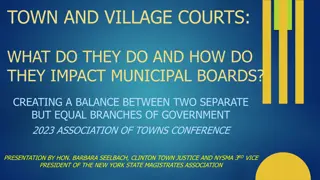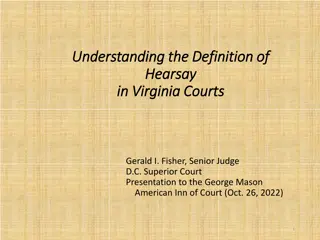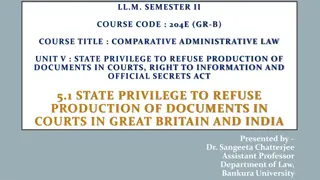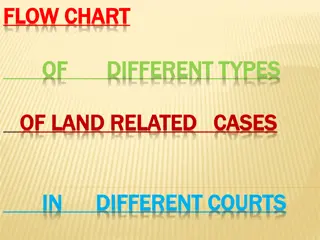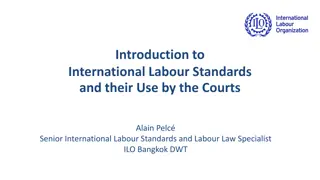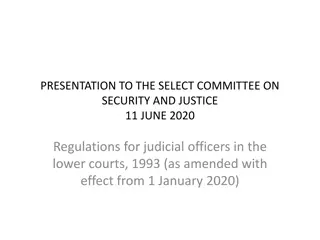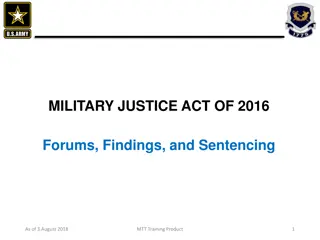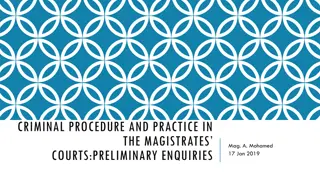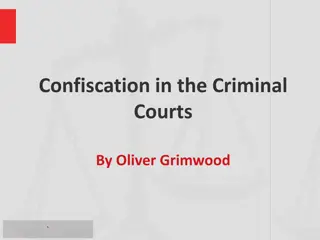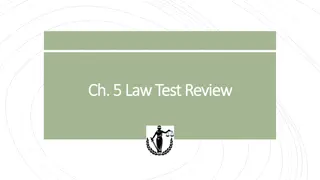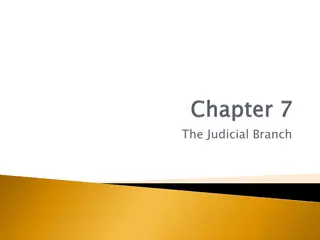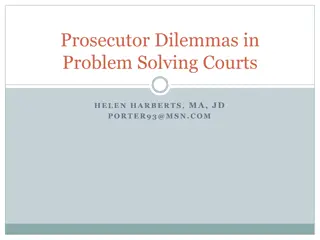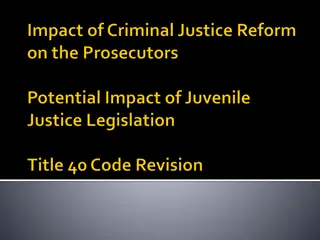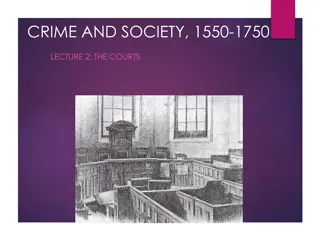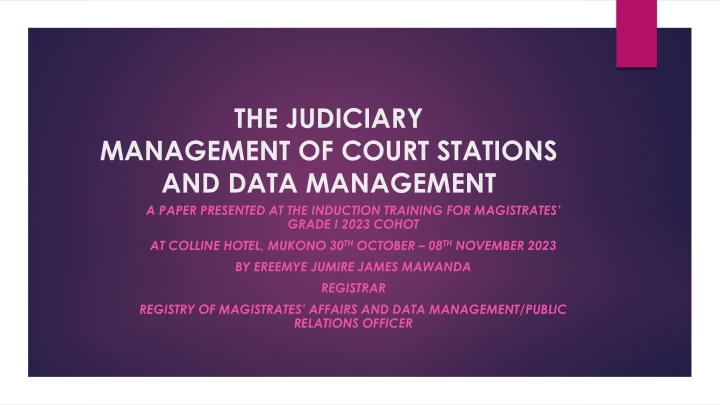
Judiciary Management of Court Stations and Data: A Comprehensive Overview
Explore the essential aspects of the judiciary's role in managing court stations and data, presented at a training session for Magistrates Grade I. Topics covered include the applicable laws, organizational structure, data management, and the conference's objectives. Gain insights into the purpose of the presentation and the key concepts discussed, such as management, reporting, and organizational culture.
Download Presentation

Please find below an Image/Link to download the presentation.
The content on the website is provided AS IS for your information and personal use only. It may not be sold, licensed, or shared on other websites without obtaining consent from the author. If you encounter any issues during the download, it is possible that the publisher has removed the file from their server.
You are allowed to download the files provided on this website for personal or commercial use, subject to the condition that they are used lawfully. All files are the property of their respective owners.
The content on the website is provided AS IS for your information and personal use only. It may not be sold, licensed, or shared on other websites without obtaining consent from the author.
E N D
Presentation Transcript
THE JUDICIARY MANAGEMENT OF COURT STATIONS AND DATA MANAGEMENT A PAPER PRESENTED AT THE INDUCTION TRAINING FOR MAGISTRATES GRADE I 2023 COHOT AT COLLINE HOTEL, MUKONO 30THOCTOBER 08THNOVEMBER 2023 BY EREEMYE JUMIRE JAMES MAWANDA REGISTRAR REGISTRY OF MAGISTRATES AFFAIRS AND DATA MANAGEMENT/PUBLIC RELATIONS OFFICER
LAY OUT PURPPOSE AND OBJECTIVES OF THE PRESENTATION. INTRODUCTION LAW APPLICABLE DEFINITION OF CONCEPTS MANAGEMENT DATA MANAGEMENT OF COURTS DATA MANAGEMENT REPORTING ORGANIZATIONAL STRUCTURE ORGANIZATION CULTURE WAYFORWARD CONCLUSION
PURPOSE AND OBJECTIVES OF THE PRESENTATION The conference is intended to equip the New Magistrates on their roles and responsibilities in the New judiciary. Remind the participants their duty as managers and reporting as a tool in measuring performance in the New Judiciary. Re-align participants to the expected standards of conduct and decorum while at stations. Retool participants on how to manage data, data processing and submission at the duty stations. To educate the participants on the dictates of organizational structure and culture At the close of the session, participants should be able to return and effectively discharge their mandate, duties and responsibilities. Allow the development of a Way forward and recommendations to the judiciary.
INTRODUCTION The Judiciary is a key stakeholder in the administration of justice. This role stems from the mandate under the constitution of Uganda (Art. 28 and 126 C.O.U 1995). In so doing, the judiciary has had to develop new strategies and innovations to achieve the vision justice for all . This conference being one of these, is a timely tool at this moment when Uganda is unveiling THE NEW JUDICIARY (Sarah Langa Siu. CR 2021) The new MISSION is to efficiently and effectively administer justice .
LAW APPLICABLE Law Applicable to Judicial officers Constitution of Republic of Uganda 1995 The Public Service Act 2008 The Administration of Judiciary Act 2020 The Judicial Service Commission Act 2005 The Magistrates Courts Act Cap 16 Judicial Service Commission (Complaints and Disciplinary Proceedings) Regulations SI No.88 of 2005 Code of Conduct and Ethics for Uganda Public Service Uganda public service standing orders, 2010 Administrative instructions. ETC
DEFINITION OF CONCEPTS MANAGEMENT MANAGEMENT OF COURT STATIONS ORGANIZATIONAL STRUCTURE ORGANIZATIONAL CULTURE DATA DATA MANAGEMENT/PROCESSING Statistical Reports PERFORMANCE REPORTS
MANAGEMENT Oxford dictionary, The process of dealing with or controlling things or people. An act or art of dealing with or controlling . Means conducting and supervising things or people
Management of court stations Management is dealing with things or controlling people. At stations, apply principles of management. (Read Dan Voich and Daniel A Wren. Oct 1983). The FIVE FUNCTIONS OF GREAT MANAGEMENT (Bill Davis, MA, CM, Forbes school of Business at Arizona University). Planning Organizing Staffing Leading Controlling Henri Fayol, gives 14 principles. (Read).
Planning When you think of planning in a management role, think about it as the process of choosing appropriate goals and actions to pursue and then determining what strategies to use, what actions to take and deciding what resources are needed to achieve the goals. Planned Resources go with accountability. At stations what have you done so far?
Organizing This is the process of establishing your core roles, case load and worker relationships. Organizing allows workers to work together to archive the organizational goals .. Develop team work at stations. You take decisions, require interpersonal skills.. You are role models, and you give information to teams.
Staffing Recruiting and selecting employees for positions within the organization (within teams and departments) HR function, Headquarters, Kampala What is the staffing level at stations? What have you done wit them?
Leading This function involves articulating a vision, energizing employees, inspiring and motivating people using the vision, influence, persuasion, and effective communication skills. Are you leading????
Controlling Evaluate how well you are achieving your goals, improving performance, taking actions. Put processes in place to help you establish standards, so you can measure, compare and make decisions . Performance decisions!!!! Controlling, what are we doing at stations?
DATA Oxford dictionary again Facts and statistics collected together for reference or analysis Quantities, characters or symbols on which operations are performed by a computer, which may be stored and transmitted in the form of electrical signals and recorded on magnetic, optical, or mechanical recording media They inform the logic and basis of reasoning or calculation. They inform your performance at stations.
DATA MANAGEMENT/PROCESSING The carrying out of operations on data especially on a computer, to retrieve, transmit, transform or classify information. There is equally manual data processing where there is no computer Data on cases brought forward, registered, completed and disposed off Equally the mode of disposal, dismissed, judgment, ADR, etc NOTE Often left to clerks!!!!!! The results of the above are data full of errors, mistakes etc.
Data- Monthly statistical Reports These are case statistical reports from courts across the country. They inform individual and court performance per month Registry handles statistics from all courts (Grade 2 courts up to the Supreme Court) Helps track individual performance under the KPIs for each JO. Informs decisions on allocation of both human and financial resources to courts. OP, Locus funds, sessions, transfers etc. Sent to <RMAstatistics@judiciary.go.ug>
PERFORMANCE REPORTS A performance report is just a report on the performance of something. The courts. These are routinely produced by government entities financed by public funds showing that the money was spent efficiently and usefully. Accountability. The registry receives performance reports from the Chief magistrate s and Magistrates Grade 1 in charge courts and submits them to the Chief Registrar for further analysis and action. Submits them to top management for discussion. These must capture, situation report, case load, staffing and staffing gaps, innovations at stations by you, relationships with other stakeholders, achievements challenges, and possible recommendations. Note : The Statistical Report for Court and Individual performance for September 2023 showing the best and least performers is already with the CR .
OVERALL COURT PERFORMANCE FOR SEPTEMBER 2023 S/No Court Level Brought Forward Registered September 2023 37 Cases of in September 2023 12 Disposed Pending Backlog 747 772 1 Supreme Court 331 9,459 221 66 9,614 2 Court of Appeal/ Constitutional Court High Court Divisions 5,718 25,653 1,239 1,307 25,585 3 9,495 38,698 1,854 1,481 39,071 4 High Court Circuits 17,836 59,013 15,160 11,568 62,605 5 Chief Magistrate Courts 9,274 22,846 7,001 6,661 23,186 6 Grade I Magistrate Courts 2,355 656 156 348 464 7 Grade II Magistrate Courts 16 157,072 25,668 21,443 161,297 Total 45,025
PENDING AND BACKLOG CASES BY COURT LEVEL FOR SEPTEMBER 2023 Backlog Pending 331 Supreme Court 772 5,718 Court of Appeal 9,614 9,495 High Court Divisions 25,585 17,836 High Court Circuits 38,500 9,274 Chief Magistrate Courts 61,874 2,355 Magistrate Grade I Courts 21,904 16 Magistrate Grade II Courts 464 0 10000 20000 30000 40000 50000 60000 70000
MONTHLY REPORTING TOOLS Monthly Reporting Tool For Court Performance Monthly Reporting Tool For Judicial Officers and Head of Stations Monthly Reporting Tool For Magistrates Grade One (Research)-Under Consideration
ORGANIZATION STRUCTURE Organizational structure is important in driving the business forward and every organization has a structure. No matter the organizationally specific title, organizations contain front-line, middle and top managers. The higher you go the fewer people to directly manage. But all these management roles and levels have specific tasks and duties to perform. According to Jones and George, . A managerial role is the set of specific tasks that a manager is expected to perform because of the position he or she holds in an organization.
ORGANIZATIONAL CULTURE Every organization has a culture that has been developed over a century or many years of the organizations existence. These are a collection of values, expectations, and practices that guide and inform the actions of all team members. These are key to the development of the traits necessary for the business success. This manifests in a number of ways. Ethics Integrity Decorum Attributes xxxxxxxxRespect of seniorsxxxxxxxx
WAYFORWARD Revise the standing orders and instructions from time to time Learn organization culture Embrace change and learn appropriate decorum Keep good work ethics and integrity. Be innovative Submit correct and timely reports Aluta continua .
CONCLUSION The new judiciary will not have room for mediocre In disciplined and corrupt staff Keep ethical behavior and be client centered For God and my country

